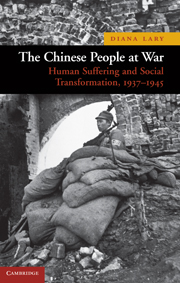Book contents
- Frontmatter
- Contents
- List of Illustrations
- List of Maps
- Preface
- Introduction: The Human Cost of War
- 1 The High Tide of War: July–December 1937
- 2 Defeat and Retreat: 1938
- 3 Stalemate and Transformation: 1939–1941
- 4 Grim Years: 1942–1944
- 5 Turning Points: 1944–1945
- 6 The Immediate Aftermath of the War: 1945–1946
- 7 The Legacy of the War
- Final Words
- Glossary
- Index
- References
2 - Defeat and Retreat: 1938
Published online by Cambridge University Press: 05 June 2012
- Frontmatter
- Contents
- List of Illustrations
- List of Maps
- Preface
- Introduction: The Human Cost of War
- 1 The High Tide of War: July–December 1937
- 2 Defeat and Retreat: 1938
- 3 Stalemate and Transformation: 1939–1941
- 4 Grim Years: 1942–1944
- 5 Turning Points: 1944–1945
- 6 The Immediate Aftermath of the War: 1945–1946
- 7 The Legacy of the War
- Final Words
- Glossary
- Index
- References
Summary
Events
越挫越勇
The more one is defeated, the more courageous one is
In the first two months of 1938, China drew its breath and tried to come to terms with the horror of the losses of late 1937. There was a widespread expectation amongst foreign observers that the government finally would surrender to Japan and that Chiang Kai-shek, the man most closely associated with the defeat, would be forced to resign. Neither thing happened. The Japanese had united China. “The propaganda of her bombs, and even more the domineering attitude of her soldiers, has been far more effective in instilling a hatred of all thing Japanese into all classes from the illiterate coolie upwards.” United China needed a leader, and the only one available was Chiang; he held onto his position, although his autocratic style was severely curtailed. The political culture that flowered in Wuhan was unfettered and creative, possibly the freest that China had ever known.
Early in 1938, the Chinese armies prepared a counter-attack. It came in March in Jiangsu, to the north of the Yangzi. For the first time, Chinese troops defeated the Japanese at the battle of Taierzhuang. The counter-attack did not hold; by May, Chinese troops were falling back again, but China's will to resist had been established, and surrender was no longer an option.
- Type
- Chapter
- Information
- The Chinese People at WarHuman Suffering and Social Transformation, 1937–1945, pp. 44 - 77Publisher: Cambridge University PressPrint publication year: 2010



